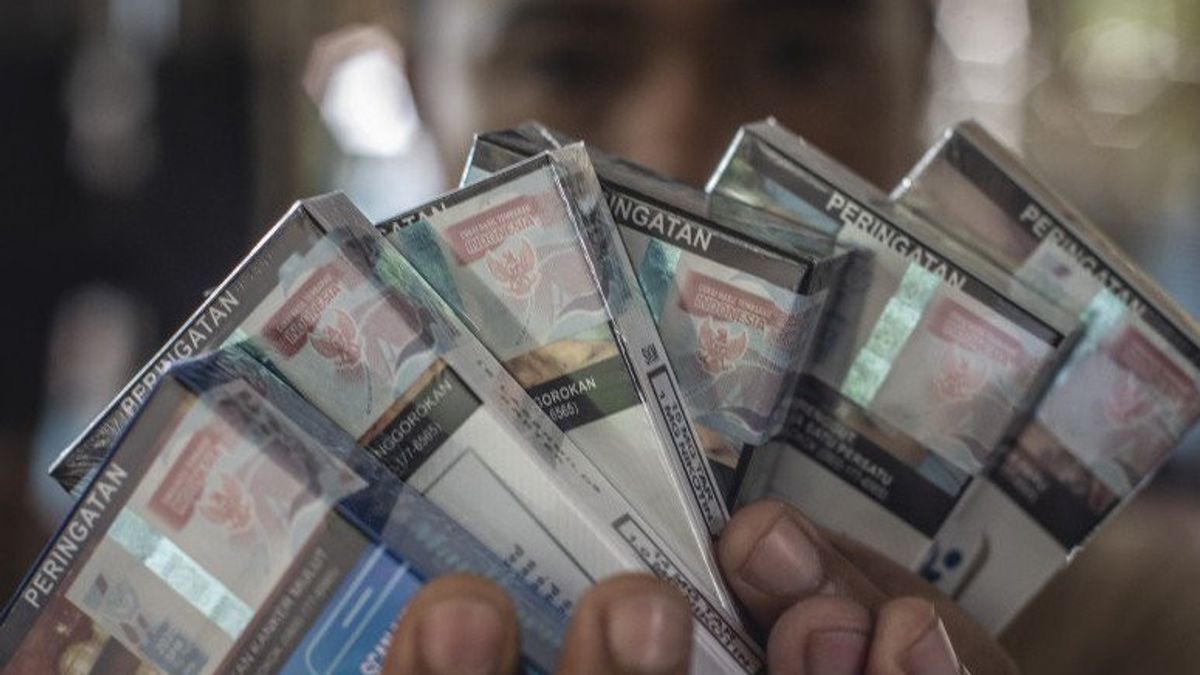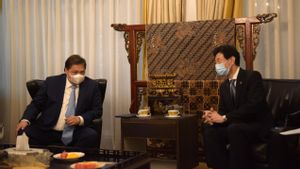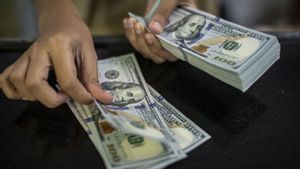JAKARTA - The Directorate General of Customs and Excise at the Ministry of Finance (Kemenkeu) admits that the circulation of illegal cigarettes goes hand in hand with an increase in tobacco excise rates.
Director of Communications and Service User Guidance at the Directorate General of Customs and Excise, Nirwala Dwi Heryanto, said that the increase in cigarette excise rates would have a positive correlation with the circulation of illegal cigarettes in the country. According to her, the impact of the pandemic has caused people's purchasing power to weaken while the price disparity between legal and illegal cigarettes is getting wider.
Not only that, the high burden of state levies on legal cigarettes has led to an increasing number of illegal cigarette dealers.
"Currently, the disparity between illegal and legal cigarettes has reached 68 percent. Previously, before VAT increased it was around 62 percent, but once VAT increased from 9.1 percent to 9.9 percent it became 68 percent," she said, as quoted on Tuesday, November 8.
She revealed that illegal cigarettes are cigarettes circulating in Indonesia, both originating from domestic and imported products that do not follow the rules that apply in the Indonesian jurisdiction.
Meanwhile, the characteristics of illegal cigarettes are, among others, not affixed with excise stamps (plain cigarettes), affixed with excise stamps that are not in accordance with their designation, affixed with fake excise stamps, and affixed with used excise stamps.
Furthermore, Nirwala explained that law enforcement against perpetrators of illegal cigarette sales is to provide administrative and criminal sanctions as regulated in Law Number 39 of 2007 amendments to Law Number 11 of 1995 concerning excise.
The sanctions for criminal violations related to the circulation of illegal cigarettes are imprisonment for a maximum of five years and/or a fine of a maximum of ten times the value of the excise that should be paid. Therefore, in order to eradicate the circulation of illegal cigarettes, Customs and Excise continue to improve the supervision of the circulation of illegal cigarettes through the operation "Illegal Cigarette Attack".
Based on Customs records, Operations against Illegal Cigarettes in the period 2018 - 2022 continue to experience an increase in the number of prosecutions, while the number of goods resulting from prosecution (BPH) tends to decrease every year.
"In 2020, the number of prosecutions amounted to 9,018 with state losses reaching more than IDR 662 billion. In 2021 the number of prosecutions rose to 13,125 with state losses reaching IDR 293 billion. Meanwhile, in 2022 until now the total prosecution has increased to 18,659 with total state losses reaching IDR 407 billion," explained Nirwala.
According to her, the success of eradicating illegal cigarettes requires the cooperation of many parties, both the government and the community.
"It is hoped that the operation against Illegal Cigarettes can improve the compliance of entrepreneurs so as to create justice and balance," she said.
The same thing was also expressed by the Executive Director of the Institute for Development of Economics and Finance (INDEF) Tauhid Ahmad. According to him, the higher the cigarette excise rate increase, the higher the circulation of illegal cigarettes.
"So, the circulation of illegal cigarettes is very dependent on the amount of the increase in cigarette excise rates. If the increase in excise is still normal, automatically the circulation of illegal cigarettes is only that way," he said.
According to him, as a sector that has a major contribution to state revenue in terms of cigarette excise, regulations that favor the tobacco products industry (IHT) sector are needed, among others, firstly, regulations that favor the industry, including those related to setting cigarette excise rates.
Second, the policy of cracking down on illegal cigarettes. According to him, the more massive the increase in illegal cigarettes, the healthier the tobacco industry will be.
"This means that the market is getting bigger, and producers are no longer afraid to produce. However, if enforcement is low, the circulation of illegal cigarettes will automatically be high, so the market for legal cigarettes will decrease," he explained.
Third, related to the rules regarding promotion. According to him, PP 109 of 2012 has been very supportive of the sustainability of the IHT sector, although in practice there are still many shortcomings.
"Currently, for promotion, digital is used which is increasingly difficult to control and does not know the time. For others, there is a time limit, when will she promote, and so on," said Tauhid.
Fourth, import-export arrangements related to raw materials. And the last one is about preventing policies that support the prevalence of children. "It's also important to support the industry. We also don't want this industry to continue to be accused of poisoning the future of children," he explained.
Tauhid said, there are several ways to prevent the increasingly massive circulation of illegal cigarettes, among others, first, the increase in cigarette excise rates is not too high.
SEE ALSO:
Second, coordinate with industry players to monitor the circulation of illegal cigarettes. According to him, this coordination is very important to help inform the government regarding the market area for illegal cigarettes.
Third, expanding human resources (HR) in the regions, as well as increasing the budget related to cracking down on the circulation of illegal cigarettes.
"I believe that in reality, illegal cigarettes may be bigger than official data from Customs, because from Customs it is the data on enforcement, not the circulation of illegal cigarettes. So a new instrument needs to be built," said Tauhid.
Responsibilities of the Directorate General of Customs
On the other hand, GAPPRI Secretary-General Willem Petrus Riwu said eradicating illegal cigarettes was entirely the responsibility and authority of the Directorate General of Customs and Excise. According to him, the current structure of illegal cigarette circulation is very strong.
"Sometimes the factory just looks at it, and provides information if requested," he said.
Regarding data on the circulation of illegal cigarettes, Willem said that data like this could not be provided, except for the Central Statistics Agency (BPS).
"My experience ended up being detrimental and difficult for the factory. We saw that the main tasks of industrial development, labor development, and role development were that they should have had that data," said Willem.
Furthermore, Willem said that eradicating illegal cigarettes must be extraordinary, because this is an extraordinary crime. Its eradication is quite difficult and several law enforcers from Customs and Excise have become victims.
"Our proposal is how to eradicate illegal cigarettes in a safe way, don't raise excise rates too high so that the price difference is not too big between legal and illegal cigarettes," he said.
"Imagine that legal cigarette manufacturers have to pay taxes, excise and local taxes of around 73-82 percent of the value sold. So illegal cigarettes selling at 80 percent below the price of legal cigarettes can profit and grow, and the state will lose revenue and threaten The state budget law has a negative impact on the nation because more and more are operating illegally," concluded Willem.
The English, Chinese, Japanese, Arabic, and French versions are automatically generated by the AI. So there may still be inaccuracies in translating, please always see Indonesian as our main language. (system supported by DigitalSiber.id)

















